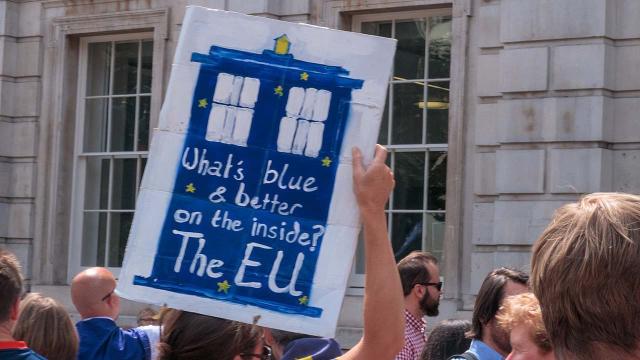Most of us have heard by now about Theresa May’s historic defeat in parliament on 15 January 2019, with many criticisms of her withdrawal deal not being up to scratch or in the UK’s best interests.
One major issue which came to light was the border between Northern Ireland and the Republic of Ireland and how this relationship will continue post-Brexit. It’s clear that neither the UK, Ireland, nor the EU wants a hard border, but with the proposed Irish backstop being almost unanimously rejected, it’s unclear how this issue is going to be resolved.
History of violence in Ireland
Once upon a time, Great Britain ruled all of Ireland. This was the status-quo for hundreds of years until Ireland separated in the 1920s, with Northern Ireland remaining part of GB and the Republic of Ireland becoming a separate country in its own right.
Over the next few decades, tensions between Unionists (those remaining in GB) and Nationalists (those wanting independence) grew, resulting in violence in the 1960s, also known as the period of 'Troubles'.
This violence continued from the 1970s to 1990s, with thousands of deaths on each side. The UK sent in armed forces, which were met with opposition by the IRA (Irish Republican Army). In 1972, 14 people were killed in Londonderry during a Catholic peaceful civil rights march, a date which became known as 'Bloody Sunday', while the IRA targeted British police and soldiers patrolling the streets.
For a long time, nobody thought it would be possible to return peace to Ireland.
The Good Friday Agreement
After years of violence and fighting, the IRA announced they would stop bombing and shooting in the 1990s and the Unionists, Nationalists and British politicians were able to discuss their issues for the first time.
In 1998, the Good Friday Agreement was signed, resulting in a new government being formed which shared power between Unionists and Nationalists in a group called the Northern Ireland Assembly.
Why does the Irish border matter for Brexit?
After 30 years of fighting and 8 years of negotiations, understandably nobody really wants to breach the Good Friday Agreement and risk the peace which took so long to find.
So far, the UK and Republic of Ireland both belonging to the EU and Single Market has allowed free movement of goods and people, which has meant that there’s been no need for any sort of formal border to be in place. This has been great for cooperation between Irish states and minimises conflict thanks to the Northern Ireland Assembly. However, when the UK leaves the EU on 29 March 2019, this could cause problems for the state of equilibrium across the Irish border as Northern Ireland will also leave on 29 March, while the Republic of Ireland will remain a member of the EU and be bound by their regulations, separate from the UK.
Theresa May insists she’s “determined” to deliver Brexit “on time,” on March 29, despite ministers in her own Cabinet suggesting a delay could be needed https://t.co/So0UFp7oQh
— Bloomberg Brexit (@Brexit) 3 February 2019
As part of the Brexit negotiations, the UK has stated an intention to leave the customs union and single market, meaning that checks may be required on goods and people crossing the border between the Republic of Ireland and Northern Ireland.
Although this doesn’t necessarily mean the Good Friday Agreement can’t be upheld, it has been far easier to carry on the peace agreement without any sort of border between the two parts of Ireland.
No Deal Brexit
As part of Brexit negotiations, the UK has expressed intention to leave the EU customs union and singles market. Although the Good Friday Agreement can, in theory, be upheld even if the UK leaves the single market, it will mean that some sort of border and regulatory checks on goods coming in/out of the UK will be necessary. Currently, there’s little more than a different coloured signpost to signal the transition between the two countries.
A no-deal Brexit, however, could be catastrophic for the peace agreements in Ireland, as this would almost definitely require a hard border in Ireland.
This could include physical border control such as cameras and guard posts, as well as passport checks and other restrictions to the free movement which has been essential in creating cooperation between Northern Ireland and the Republic of Ireland.
What is the Irish backstop?
In an attempt to resolve the tensions surrounding the Irish border, Theresa May and EU officials have negotiated a ‘Backstop’ between Northern Ireland and the Republic of Ireland. In practical terms, this would involve the UK and Northern Ireland remaining in the EU customs union in all but name in order to avoid a hard border and physical checks being necessary. It would also bind the UK and Northern Ireland by many rules of the single market, with no ability to have a say in what these are.
Under the agreement reached by Mrs May, the backstop would come into force if no agreement is reached between the UK and EU before the Brexit deadline of 29 March 2019, and could last until 2020, with the ability to extend to 2022 and beyond if required.
Why is this a problem?
The main problem highlighted by the proposed Irish backstop is that it would leave us obligated to follow EU rules and regulations when it comes to free movement of goods and services, with no say in how these come about.
European leaders have also insisted that this backstop should have no definitive end date, so we could be stuck in this restricted position indefinitely.
There’s also a question of how future trade deals for the UK with the rest of the world might be affected if we’re still bound by many of the rules of the single market and EU customs union, with fear that this might prevent us signing deals with other countries.
Any return of a hard Irish border could threaten support for a post-Brexit trade deal with the U.S., congressman says https://t.co/P7oSBXkt9L
— Bloomberg Brexit (@Brexit) 3 February 2019
An alternative solution presented by European leaders involves a separation between the UK and Northern Ireland, with NI abiding by the rules listed in the backstop agreement while separate rules are adopted for the rest of the UK. This has been rejected by the UK based on the rift it could cause to have a virtual border between Northern Ireland and the rest of the UK, cutting Ireland off by the sea and moving NI closer to reconnecting with the Republic of Ireland.
Previous issues surrounding Ireland
Although the issue of the day seems to be how Brexit will affect the Irish border, there have already been issues raised which conflict with the principles of the Good Friday Agreement over the last few years.
One notable problem was the Conservatives negotiating a coalition with the DUP (Democratic Unionist Party), as some argue this agreement undermines many of the principles of the Good Friday Agreement, particularly as the DUP has been recorded as being against this vital agreement.




